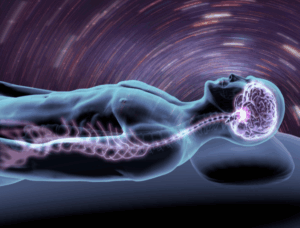When it comes to staying sharp, most people focus on exercise, diet, maybe a supplement or two. But what if I told you the most powerful brain detox system in your body only turns on when you’re asleep – and that your sleep habits, stress levels, and even the position you sleep in can make or break how well it works?
Meet the glymphatic system – a relatively newly discovered brain-wide waste clearance network that might hold the key to preventing cognitive decline, Alzheimer’s, and even day-to-day brain fog. It’s like your brain’s overnight janitor crew, flushing out harmful gunk like amyloid-beta and tau proteins while you’re off in dreamland.
So why haven’t more of us heard of it? Because the science is still pretty new, but emerging research, especially a landmark study titled “The Sleeping Brain: Harnessing the Power of the Glymphatic System through Lifestyle Choices,” is changing that fast.
In this blog, we’ll break down how the glymphatic system works, how it gets weaker with age, and most importantly, what you can do to keep it running strong.
What Is the Glymphatic System?
Discovered in 2012, the glymphatic system is the brain’s version of the lymphatic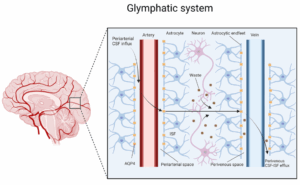 system – just a lot more specialized. It moves cerebrospinal fluid (CSF) through channels that line your brain’s blood vessels. This fluid flushes out metabolic waste, including the protein clumps linked to Alzheimer’s and other neurodegenerative conditions.
system – just a lot more specialized. It moves cerebrospinal fluid (CSF) through channels that line your brain’s blood vessels. This fluid flushes out metabolic waste, including the protein clumps linked to Alzheimer’s and other neurodegenerative conditions.
This isn’t just theoretical. When researchers blocked the glymphatic system in animals, waste built up fast. And when the system ran optimally, brain clarity, cognitive function, and memory improved. Think of it like your brain’s plumbing: if it clogs, everything suffers.
But here’s the twist – this system only really kicks into high gear when you’re deep asleep.
Why Sleep Is Your Brain’s Cleaning Cycle
If you needed another reason to take sleep seriously, this is it.
The vast majority of glymphatic clearance happens during slow-wave sleep, also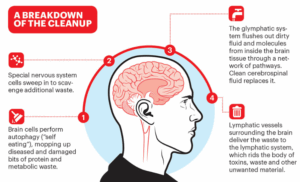 known as N3 or deep sleep. During this stage, your brain’s interstitial space expands, allowing CSF to flow more freely and wash out waste products. Studies show that clearance can be up to 90% more active during deep sleep than when you’re awake.
known as N3 or deep sleep. During this stage, your brain’s interstitial space expands, allowing CSF to flow more freely and wash out waste products. Studies show that clearance can be up to 90% more active during deep sleep than when you’re awake.
What’s more, men tend to lose deep sleep as they age. That means glymphatic function declines just when you need it most. And since Alzheimer’s and other neurodegenerative diseases often start with the buildup of waste proteins, you can see the problem.
It’s not just about sleep quantity, either. Sleep quality and timing matter, and so do a few other lifestyle choices you might not expect.
6 Lifestyle Habits That Supercharge (or Sabotage) Brain Detox
1. Sleep Position: Side-Sleep for the Win
It turns out that how you sleep matters, not just how long. Research suggests that sleeping on your right side may help clear waste more efficiently than sleeping on your back or stomach. People with neurodegenerative conditions tend to spend more time in the supine (back) position – possibly contributing to plaque buildup.
Pro tip: If you snore or toss and turn a lot, try a body pillow or positional therapy device that encourages side-sleeping.
2. Omega-3s: Brain Lubricant with Bonus Benefits
Omega-3 fatty acids – especially the kind found in cold-water fish – do more than protect your heart. They: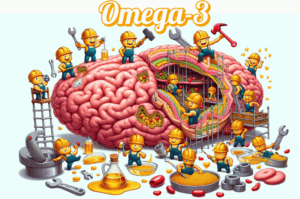
- Reduce inflammation in the brain.
- Promote better glymphatic flow.
- Help maintain AQP4 polarity (the key water channels for fluid exchange).
Translation: more omega-3 = cleaner brain. And since men often fall short on omega-3s, consider a high-quality fish oil or krill oil supplement if you’re not getting 2-3 servings of fatty fish per week.
3. Intermittent Fasting: More Than a Fat-Burner
Fasting triggers a metabolic switch that produces β-hydroxybutyrate, a ketone that helps reprogram your brain cells. This ketone acts as an HDAC inhibitor, which boosts glymphatic function by improving AQP4 channel orientation.
In simple terms: fasting helps your brain clean itself better.
Animal studies show alternate-day fasting reduces amyloid-beta buildup and may even protect against cognitive decline. While more human research is needed, the evidence is promising.
Just make sure you’re not layering fasting on top of high stress or poor sleep – it’s a tool, not a cure-all.
4. Alcohol: Dose Makes the Poison
This one’s complicated. Low doses of alcohol (think a half-glass of wine or a small beer) might enhance glymphatic activity. But moderate to high doses? The opposite. Heavy drinking:
- Disrupts AQP4 channel polarity.
- Increases inflammation.
- Slows glymphatic clearance.
If you drink, keep it light and occasional. Anything more is likely doing more harm than good, especially to your brain.
5. Exercise: Sweat to Detox the Mind
Regular movement doesn’t just help your body – it upgrades your brain’s self-cleaning process too.
Voluntary running in animal models improved glymphatic clearance, boosted memory, and reduced brain inflammation. Exercise increased the expression and organization of AQP4 channels, leading to better fluid flow and plaque removal.
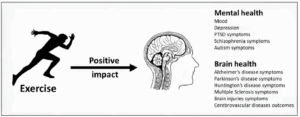
What kind of exercise helps?
- 150 minutes/week of moderate activity (brisk walking, cycling).
- Or 75 minutes/week of vigorous activity (HIIT, sprints, martial arts).
Mixing resistance training with cardio seems to have the best results overall.
6. Chronic Stress: The Silent Saboteur
Stress floods your system with cortisol, a hormone that, in excess:
- Reduces AQP4 channel numbers.
- Depolarizes existing channels.
- Increases amyloid production.
In short, stress clogs your brain’s drains. Long-term stress is a known risk factor for Alzheimer’s and can be especially brutal for men who internalize emotions or avoid recovery practices.
Meditation, breathwork, and cold exposure can all help manage stress, but the key is consistency. Even 10 minutes a day of intentional down-regulation adds up.
Bonus Support for Better Brain Environments: Aires
While your body has built-in systems to clear waste, modern environments can make
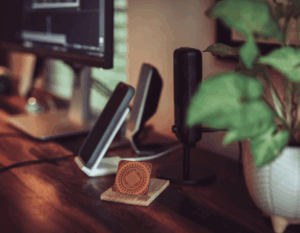
the job harder. EMF exposure from devices has been linked to sleep disruption and oxidative stress. Aires products are the only ones we’ve seen that are proven to reduce the biological impact of EMFs, creating a safer space for your brain to rest, recover, and regenerate, especially at night.
If you’re building a routine for better brain detox, consider also protecting your environment with an Aires device.
Why Men Need Support More Than Ever
Modern life already works against the glymphatic system. Blue light, poor sleep, processed food, stress, and constant digital stimulation all impair the brain’s natural rhythm.
Men – especially high performers, athletes, and aging professionals – are at risk. Why?
- They sleep less (or grind through burnout).
- They often skip emotional processing, increasing stress load.
- They’re more likely to delay addressing health symptoms.
Optimizing glymphatic flow isn’t just about avoiding disease. It’s about:
- Sharpening focus.
- Extending your mental prime.
- Improving resilience, memory, and even mood.
Your brain’s clean-up crew needs time, space, and the right conditions to work. If you support it, it’ll return the favor for decades.
Your Glymphatic Optimization Checklist
- Aim for 7–9 hours of high-quality sleep

- Track your sleep stage (especially N3) with a wearable
- Sleep on your right side as often as possible
- Take omega-3 supplements or eat fatty fish 2–3x/week
- Try intermittent fasting (start slow—maybe 12–14 hours)
- Exercise regularly (mix cardio and strength)
- Keep alcohol to a minimum
- Find a daily de-stress practice (breathwork, sauna, nature walks)
- Support your sleep environment with EMF mitigation tools/tactics (Aires, unplug your Wi-Fi at night, use wired headphones, etc)
Conclusion: Protect Your Brain Like You Protect Your Body
Longevity isn’t just about living longer – it’s about staying mentally sharp, independent, and vibrant as you age. The glymphatic system offers a powerful, natural way to do just that.
And the best part? You don’t need a prescription. Just some consistency, awareness, and smart lifestyle moves.
Your brain is working hard for you. Give it the rest – and the support – it needs to clean house.


